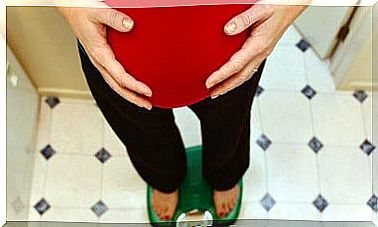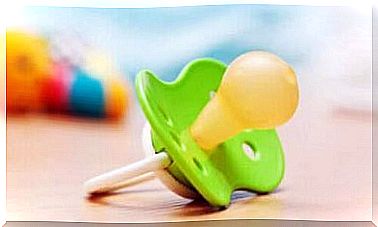Fetal Hiccups During Pregnancy: Everything You Need To Know

In this article, we tell you everything you need to know about fetal hiccups.
The bond between a mother and her unborn child during pregnancy is strengthened when she begins to feel the highly anticipated movements.
But we sometimes get worried when our baby has hiccups.
You may be wondering: How is this hiccup produced? Is it normal for a fetus to have hiccups?
Fetal Hiccups: Is It Normal?
There is no need to worry if your baby has hiccups while you are pregnant. It is a situation that often occurs and it is part of your baby’s development.
So yes, this is something that is completely normal. This hiccup can last for a few minutes or continue for half an hour.
The most important thing to keep in mind is that it is not uncomfortable for your baby. In addition, many specialists consider hiccups as a vital sign.
As our baby is still growing and maturing, his membrane can sometimes contract and produce fetal hiccups.
In other words, hiccups are caused by a spasm. The diaphragm is a muscle that helps us breathe by contracting and relaxing. It separates the thoracic cavity from the stomach.
Hiccups are the membrane’s way of exercising. It is a way in which the muscle prepares your baby’s breathing outside the womb when he is born.
Remember that your baby’s lungs will not function completely before birth; they ingest amniotic fluid while in the womb.
This fluid gets in and out of your baby’s lungs, producing contractions – hiccups – in the diaphragm, preparing your baby’s lungs for the future.

When can you feel fetal hiccups?
You will be able to feel your baby’s hiccups more clearly in the third trimester of your pregnancy. It is unknown whether fetal hiccups occur in the early stages of pregnancy.
If the little one has hiccups, you will feel a series of constant, rhythmic flaps inside your uterus. This is how you will be able to distinguish between fetal hiccups and your baby’s kicks, etc.
Function of the fetal hiccups
These spasms that your baby experiences inside the womb are part of his development. Hiccups do the following, according to experts:
- It prepares the baby so he can breathe on its own outside the womb. As mentioned earlier, the diaphragm is a muscle that helps with breathing, and fetal hiccups are caused by contractions of this muscle.
- Fetal hiccups are also associated with the development of your baby’s nervous system.
- They are associated with the training of motor skills.
- The contractions that your baby’s diaphragm produces help regulate his heart rhythm.
How to avoid fetal hiccups
Some common physical discomforts during pregnancy can be avoided or reduced, but fetal hiccups cannot. In other words, there is nothing you can do if you notice that your baby is hiccuping.
Remember that it is completely normal – it is even healthy – and it is not dangerous for your baby.
Many babies continue to have hiccups outside the womb after they are born. This is because their respiratory organs are still adapting to the outside world.

Should I be worried?
Fetal hiccups are something that seems strange, and perhaps can be bothersome at times. But under normal circumstances , you do not have to worry and there is no need to go to the doctor.
However, we recommend that you go to the doctor if the fetal hiccups continue for several hours or days. That way, you will have peace of mind when you are told that everything is as it should be and that your baby is healthy and developing normally.
Enjoy the moment when you notice that your baby is hiccuping. Sit down, place your hands on your stomach and strengthen the band for your beloved child.
It is also a good option for the baby’s father, older siblings or other family members as they can also strengthen the bond to the baby.
Now that you know the reason behind fetal hiccups, you can relax and appreciate the experience completely.









